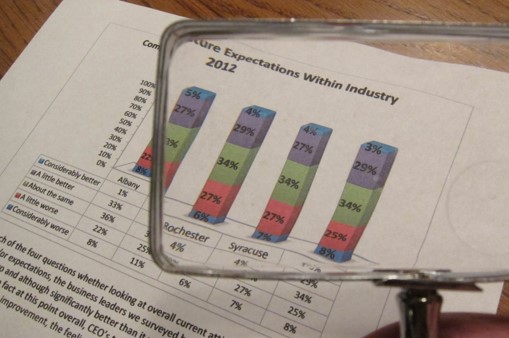Siena College: 8th Annual Upstate New York Business Leader Survey
CEO Confidence Hits Eight Year High
Predict Increasing Revenues, Profits, Asset Acquisitions & Hiring
Business Leaders Say Obamacare, Gov’t Regulation Hurt Bottom Line; Have Little Confidence in Albany, Less in D.C.
Support Infrastructure Development Especially Bridges and Roads
Loudonville, NY. Across Upstate New York, CEO confidence increased dramatically this year demonstrating more optimism than pessimism among leaders of private for-profit companies and reached the highest level in the eight year history of the annual Upstate New York Business Leader Survey from Siena College sponsored by Gramercy Communications, the Business Council of New York State and Ostroff Associates. The Index of Business Leader Confidence, computed based on interviews with 524 business leaders of companies from Buffalo, the Capital Region, Rochester and Syracuse stands at 110.4, up from 94.6 last year, well above the breakeven point of 100 at which overall optimism and pessimism are balanced. Overall, CEO’s report expected increases in revenues, profitability, asset acquisitions and hiring, as they enter 2015.
“The spring is back in the step of a growing number of Upstate’s CEO’s. Nearly four in ten are bullish about the future while only one in six remain negative on the economy. Just under half, 49 percent anticipate revenue growth and 41 percent, up from only 31 percent last year, expect their profits to increase in 2015. Another upbeat indicator – 58 percent, up from 52 percent a year ago, plan to invest in equipment, vehicles, and computers this year,” said Siena College Research Institute Director Don Levy.
Thirty-two percent of Upstate CEO’s plan to increase their workforce in 2015, up from 28 percent a year ago and for the first time, hiring plans approach the pre-recession rate of 36 percent. Manufacturing and Engineering/Construction businesses have the most aggressive hiring plans at 42 and 41 percent. Overall, 62 percent give their local area a good or excellent grade on workforce suitability.
Seventy-one percent of CEO’s say that the Affordable Care Act, Obamacare, is having a negative impact on their business and two-thirds call for its repeal. In response to the health care law, 40 percent are decreasing benefits to cut costs, 28 percent are hiring more part time employees and 20 percent are reducing the number of hours employees work.
CEO’s cite health care costs (77 percent), governmental regulation (69 percent), taxation (65 percent) and adverse economic conditions (46 percent down from 55 percent) as challenges that they are concerned about. Asked to name the single greatest challenge, governmental regulation is identified most often by one in four. Only five percent (down from 8 percent) of CEO’s think the state government is doing either an excellent or good job of creating a business climate in which companies can succeed and only 13 percent are confident in the ability of New York’s government to improve the climate. The federal government receives even lower marks with four percent saying the federal government is now doing at least a good job facilitating business success with only nine percent being confident in Washington’s ability to improve conditions.
Sixty-two percent of CEO’s support increasing federal spending on infrastructure and 42 percent (up from 32 percent last year) call on the Governor and Legislature to focus on infrastructure development. While at least 70 percent give the state good grades on the quality of the water supply systems, the natural gas system, the cell phone system and airports, a majority offer no better than a fair or poor assessment of bridges and local roads. Asked which infrastructure component is most in need of improvement, 39 percent said bridges followed by 24 percent indicating local roads. In order to finance infrastructure improvements, CEO’s most strongly support: using public/private partnerships (75 percent), pursuing federal funding (75 percent), fully privatizing development in some cases (52 percent) and reallocating dollars in the budget from Medicaid (44 percent).
Asked to name the one industry sector that will have the most positive economic impact locally, across Upstate, CEO’s name both Technology and Medical at rates of 30 to 26 percent. Sixteen percent say Manufacturing followed by 14 percent touting Education. In the Capital Region, Technology is named by a dramatic 66 percent of all area CEO’s, while 48 percent say Medical in Buffalo and 31 percent name Education in Syracuse. Rochester CEO’s expect all four of those sectors to contribute to their area’s growth.
“The panic of 2008 is gone; the premature hopefulness of 2010-11 which gave way to frustrations in 2013 has now been replaced by a more secure diversified economy in which CEO’s expect to do and profit from business. Despite their opposition to the Affordable Care Act and the impact they see it having on their business, commerce is strong enough to demand more equipment and hiring. If only the government would lessen regulation, taxation and take the lead on infrastructure development, CEO’s say the future would indeed be very bright,” Levy says.
This Siena College Poll was conducted October 22, 2014 – January 7, 2015 by telephone, mail and internet interviews with 524 Business Leaders from the Albany, Buffalo, Rochester and Syracuse MSA’s. Sponsorship for the 2014 Upstate Business Leader Survey was provided by Gramercy Communications, The Business Council of New York State and Ostroff Associates. In each of the four MSA’s the study is released in conjunction with the following media partners: Albany: The Times Union; Buffalo: The Buffalo News; Rochester: The Rochester Business Journal; Syracuse: The Central New York Business Journal. The Siena College Research Institute, directed by Donald Levy, Ph.D., conducts political, economic, social and cultural research primarily in New York State. SRI, an independent, non-partisan research institute, subscribes to the American Association of Public Opinion Research Code of Professional Ethics and Practices. For more information, call Don Levy at (518) 783-2901 or dlevy@siena.edu. For survey cross-tabs and frequencies: www.Siena.edu/SRI





